Geopolitical Timeline
James Baker's career in Washington occurred during major world events. This timeline highlights significant events in Baker’s career and some important global events in history.
The Cold War

Use the timeline above to scroll through
different eras of the Cold War.
Click on an era to view key events
as well as milestones in James Baker’s
career during the Cold War.
World Events
September 2, 1945
World War II ends.
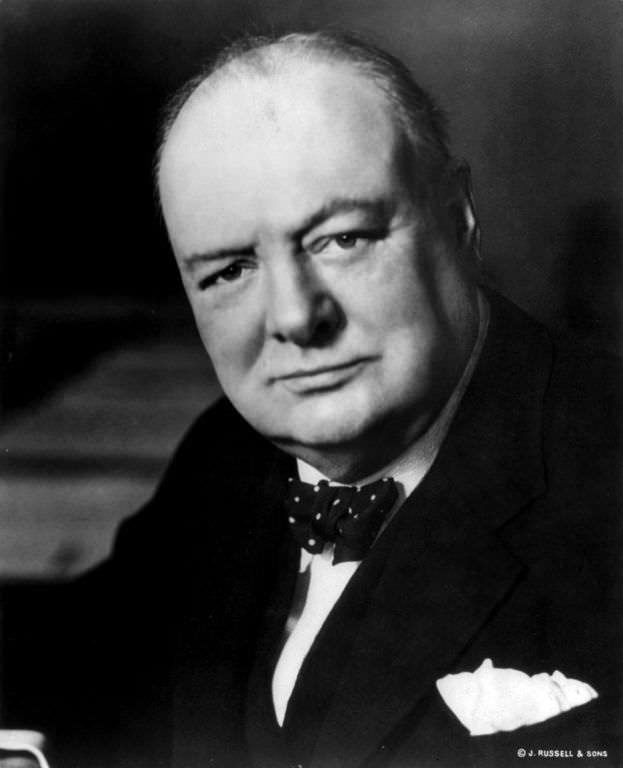
In a speech entitled The Sinews of Peace, British Prime Minister Winston Churchill warns of an “Iron Curtain” descending in Europe. The term refers to the barriers – political, military and ideological – that the Soviet Union is using to separate Eastern and Western countries.
June 5, 1947
The Marshall Plan is established. Under the plan, the United States will spend more than $12 billion to help rebuild Europe. In part, the plan is an effort to curb the influence of Soviet communism in Europe.
June 24, 1948
Soviet Premier Joseph Stalin tries to take control of the entire city of Berlin in East Germany by shutting off French, British and American access to the western portion of the city. This becomes known as the “Berlin Blockade.”
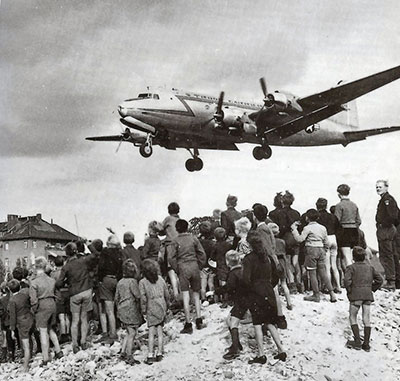
In response to the Berlin Blockade, France, Britain and the United States institute the “Berlin Airlift,” using airplanes to drop supplies into West Berlin. The tactic works and leads to the creation of two separate German states, East Germany and West Germany.
April 4, 1949
The North Atlantic Trade Organization (NATO) is founded by the United States and Western European nations as a means of aligning against communism. There are 12 founding members of the alliance.
August 29, 1949
The Soviet Union tests its first atomic bomb.
World Events
October 23, 1956
Hungarians revolt against Soviet influence in their country. The Soviet military suppresses the Hungarian revolt and establishes a communist regime in Hungary.
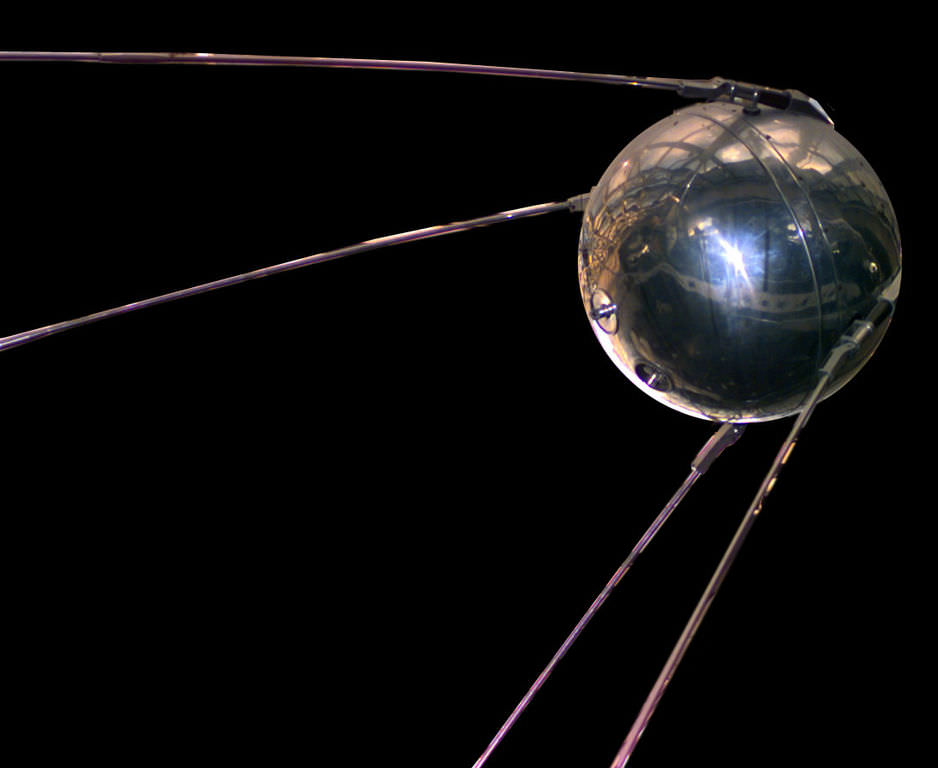
The Soviet Union launches Sputnik into space. Sputnik is the first artificial satellite to orbit Earth. This is the beginning of the “Space Race” between the U.S. and the U.S.S.R.
November 27, 1958
Soviet leader Khrushchev issues the “Berlin Ultimatum,” ordering western troops out of Berlin.
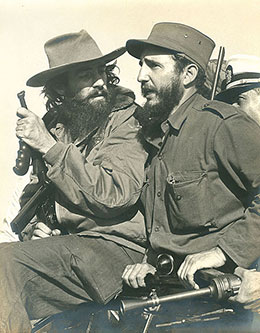
In Cuba, Fidel Castro and rebels force out dictator Fulgencio Batista and take control of the country. Cuba becomes the first communist state in the western hemisphere.
May 1, 1960
Soviets shoot down an American U-2 plane when it flies over Soviet airspace. U.S. officials initially deny that the plane had been involved in espionage – a claim the Soviets are able to disprove.
World Events
January 20, 1961
John F. Kennedy is sworn in as president of the United States.
April 17 - 19, 1961
The CIA launches an unsuccessful attempt to overthrow Cuban leader Fidel Castro in an event later known as the Bay of Pigs invasion.
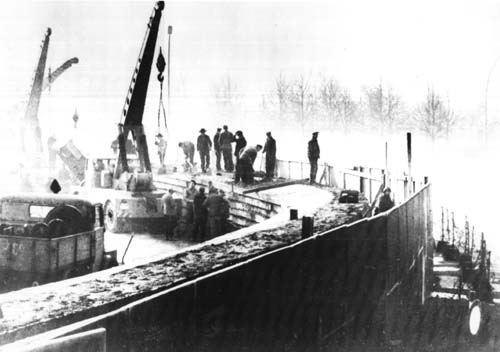
Construction begins on the Berlin Wall, a physical barricade separating West Berlin from the rest of East Germany.
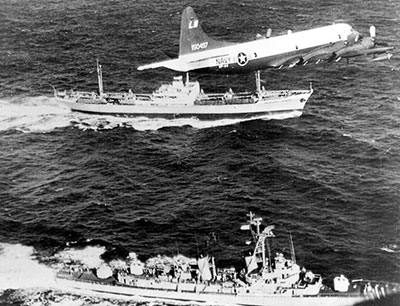
The Cuban Missile Crisis begins after the U.S. discovers Soviet missiles stationed in Cuba. The 13-day standoff between the U.S. and the Soviets is the closest the two sides come to nuclear conflict during the Cold War.
July 25, 1963
The U.S., the Soviet Union and Great Britain sign the Partial Test Ban Treaty, which states that nuclear weapons can only be tested underground.
November 22, 1963
President John F. Kennedy is assassinated. Lyndon B. Johnson becomes president of the United States.
Baker Career
1952
James Baker graduates from Princeton University.
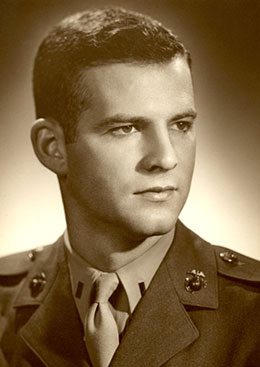
Baker serves in the United States Marine Corps, attaining the rank of first lieutenant and later captain in the U.S. Marine Corps Reserve.
World Events
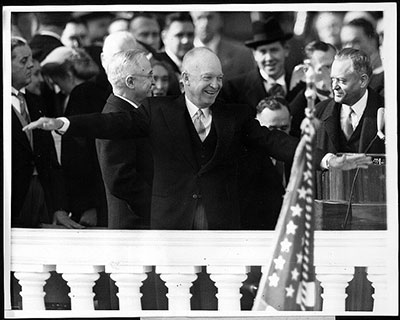
Dwight D. Eisenhower is sworn in as president of the United States.
March 5, 1953
Soviet Premier Joseph Stalin dies.
September 7, 1953
Nikita Khrushchev becomes the leader of the Soviet Communist Party.
May 9, 1955
West Germany joins NATO.
May 14, 1955
The Soviet Union and its allies in Eastern Europe (including East Germany, Czechoslovakia, Poland and Hungary) form the Warsaw Pact. The Warsaw Pact is a communist defense alliance that acts as a counterbalance to NATO.
Baker Career
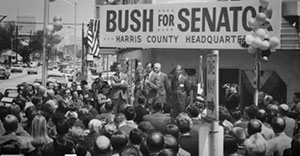
James Baker chairs George H. W. Bush’s unsuccessful Senate campaign.
>> Read more - Baker: The Accidental Operative
World Events
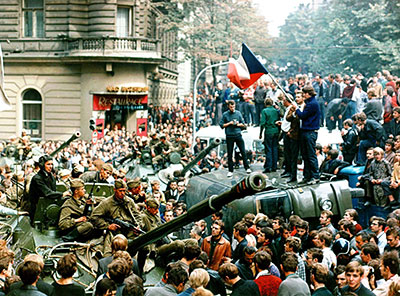
Soviet troops crush an uprising in Czechoslovakia.
January 20, 1969
Richard Nixon is sworn in as president of the United States.
Baker Career
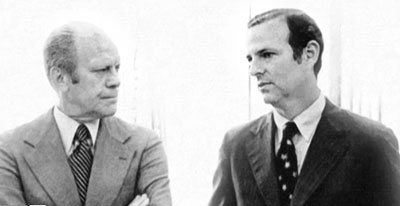
President Ford appoints James Baker as undersecretary of commerce.
World Events
May 1972
The first
Strategic Arms Limitation Talks (SALT)
conclude between President Nixon and Soviet leader Brezhnev. Their agreement marks the first time during the Cold War that the U.S. and Soviet Union agree to limit nuclear missiles.
August 9, 1974
Richard Nixon resigns as president. Gerald Ford becomes president of the United States.

The Apollo-Soyuz Test Project begins. A joint effort between American and Soviet astronauts, it marks the end of the Space Race.
Baker Career
1976
James Baker helps secure Gerald Ford’s Republican nomination for president and earns the nickname “Washington’s Miracle Man.” Baker manages Ford’s unsuccessful presidential campaign and then Baker returns to Houston.
>> Read more - Baker: The Accidental Operative
1978
James Baker runs unsuccessfully for attorney general of Texas. It is the first and last time he runs for public office.
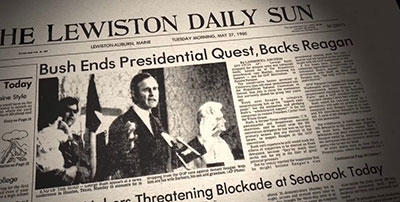
Baker manages George H. W. Bush’s presidential campaign. Recognizing that Bush will likely lose, Baker makes a strategic decision that helps propel Bush into becoming Ronald Reagan’s vice presidential running mate.
World Events
January 20, 1977
Jimmy Carter is sworn in as president of the United States.
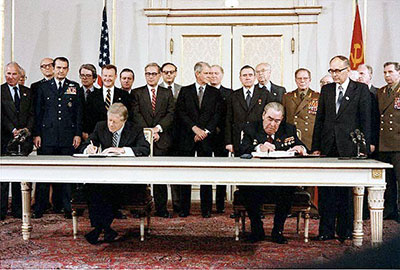
President Carter and Soviet leader Brezhnev sign the second Strategic Arms Limitation Talks (SALT) treaty. However, the U.S. Congress does not ratify the treaty because the Soviet Union invades Afghanistan later the same year.
July 1980
The Unites States protests Soviet involvement in Afghanistan by boycotting the summer Olympics, which are being held in Moscow.
Baker Career
January 20, 1981 - February 3, 1985
James Baker serves as White House chief of staff under President Ronald Reagan, sharing responsibilities with Edward Meese.
>> Read more – Baker: The Power Broker

James Baker serves as United States secretary of the treasury.
>> Read more – The Deal Maker
World Events
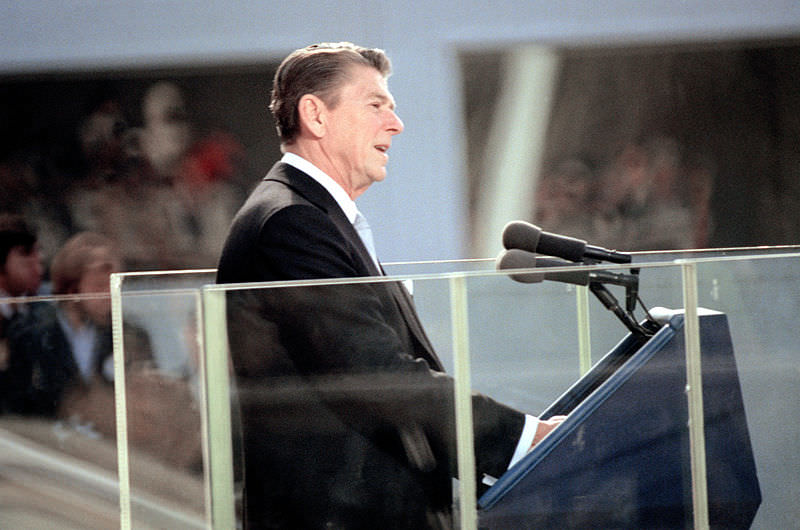
Ronald Reagan is sworn in as president of the United States.
March 8, 1983
In a speech to a group of evangelicals, President Reagan refers to the Soviet Union as the “Evil Empire.”
July 1984
The Soviet Union and several of their allies boycott the summer Olympics, which are being held in Los Angeles.
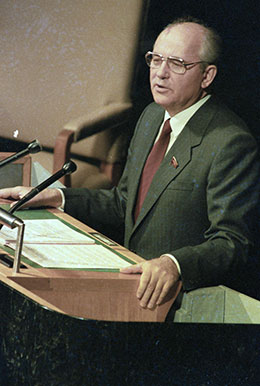
Mikhail Gorbachev becomes the general secretary of the Soviet Union.
Baker Career
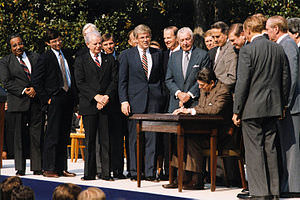
As secretary of the treasury, James Baker plays a strategic role in getting the Tax Reform Act of 1986 enacted with support from both parties of Congress.
>> Read more – Baker: The Deal Maker
1988
With President Reagan’s second presidential term nearing its end, James Baker manages George H. W. Bush’s successful presidential campaign against Democrat Michael Dukakis.
>> Read more – Baker: The Campaigner
World Events
1986
Soviet leader Gorbachev introduces “Perestroika,” a movement to restructure the Soviet regime so it can be on par economically with capitalist countries. This dramatic restructuring helps lead to the end of the Cold War.
October 11 - 12, 1986
At the Reykjavík Summit in Iceland, President Reagan and Soviet leader Gorbachev discuss banning all nuclear weapons, but fail to come to an agreement.
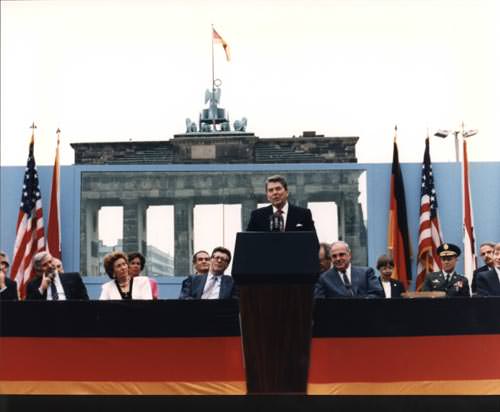
President Reagan makes a speech at the Berlin Wall, challenging Soviet leader Gorbachev to “tear down this wall.”
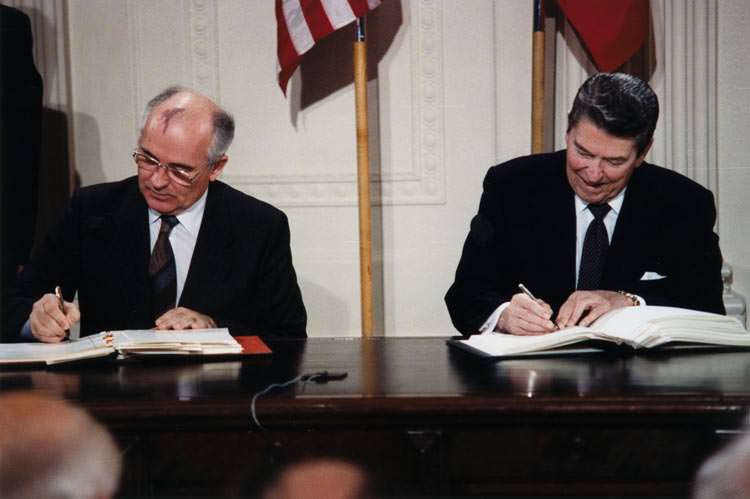
President Reagan and Soviet leader Gorbachev sign the Intermediate-Range Nuclear Forces (INF) Treaty, which eliminates intermediate-range nuclear missiles.
Baker Career
August 23, 1992
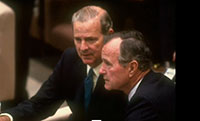
James Baker serves as United States secretary of state.
>> Read more – James Baker as a Diplomatic Leader:
End of the Cold War
World Events
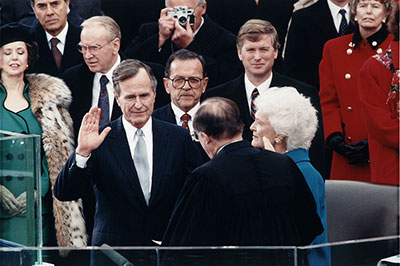
George Bush is sworn in as President of the United States.
June 4, 1989
The Communist Party loses during elections in Poland.
October 18, 1989
The Hungarian constitution is amended to allow multi-party elections.
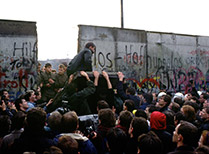
An East German official mistakenly announces that the borders of the city of Berlin are open. Tens of thousands of East Germans begin streaming over the Berlin Wall. The wall is later torn down.
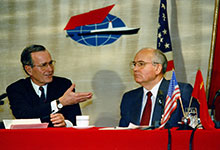
At the Malta Summit, President Bush and Soviet leader Gorbachev announce the beginning of a new era of peace.
December 1989
Communist governments fall in Czechoslovakia, Bulgaria and Rumania.
1989 - 1992
The decline of the Communist Party in Europe takes place over a two-year period.
Baker Career
August 2, 1990
After Iraq’s invasion of Kuwait, U.S. Secretary of State James Baker forms an international coalition against Iraq that includes Iraq’s Arab neighbors and the Soviets.
>> Read more – Baker: The Coalition Builder
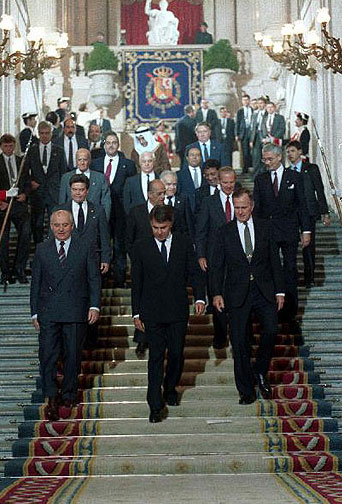
James Baker leads peace talks with Arabs and Israelis at the Madrid Peace Conference in Madrid, Spain.
>> Read more – Baker: The Peace Maker
August 24, 1992 - January 20, 1993
James Baker serves as White House chief of staff, the last public office he is to hold.
After leaving public office in 1993, James Baker becomes founding member of the James A. Baker III Institute of Public Policy at Rice University in Houston, Texas. He continues to practice law and serves in a variety of advisory capacities, serving both public and private sectors. Notably, he assists George W. Bush in winning the presidency when there is a vote count dispute in Florida.
>> Read more – Baker: The Political Tactician
World Events
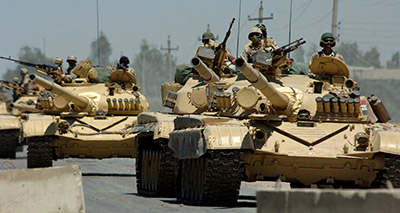
Iraq invades Kuwait. By the end of February 1991, Kuwait is liberated by an allied coalition led by the United States.
October 3, 1990
Germany is reunified.
April 1991
The Warsaw Pact is dissolved.
December 1991
The Soviet Union is formally dissolved into 15 separate countries, including Russia. This marks the end of the communist regime. Russia becomes a federal semi-presidential constitutional republic.

